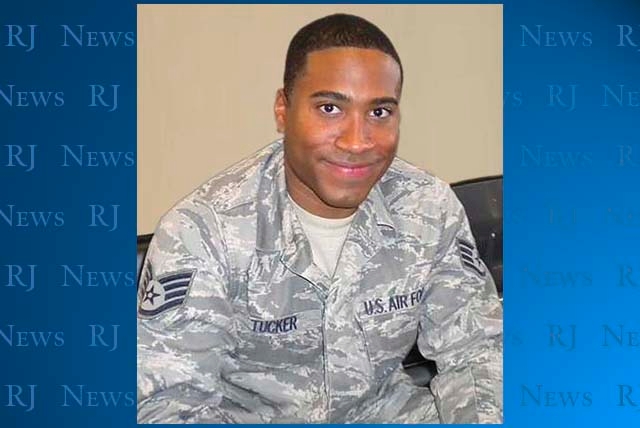Divers searching for missing airman find body at Lake Mead
After a search lasting less than two days, a man’s body was found at Lake Mead by a group of divers who were turned away by the National Park Service last year when they volunteered to look for a missing serviceman from Creech Air Force Base.
Earth Resource Group, a Las Vegas-based search and recovery organization, found the body at the bottom of the lake on Tuesday in the same area where Staff Sgt. Antonio Tucker, 28, went under while swimming on June 23.
Christie Vanover, spokeswoman for Lake Mead National Recreation Area, said Earth Resource Group used an unmanned, remote-controlled submarine to raise the body from a depth of about 280 feet. Once the dead man was within about 60 feet of the surface, he was recovered by the search crew and divers from Las Vegas police Search and Rescue.
The Clark County medical examiner is conducting an autopsy and will release the man’s identity once it has been determined, Vanover said.
Tucker’s commanding officer issued a statement Wednesday afternoon in response to the news.
“Last summer, the Creech family lost Staff Sergeant Antonio Tucker, who was presumed to have drowned at Lake Mead,” said Col. James Hecker, commander of the 432nd Air Expeditionary Wing at the Indian Springs air base. “While we have not yet received confirmed identification, we hope today’s discovery provides closure for the individual’s family and friends.”
Earth Resource Group recently obtained a two-week permit from the park service to look for Tucker’s body on behalf of his family.
The team included experienced divers and recovery experts from California, Idaho and Washington state. They began their search Monday, though windy conditions limited operations.
Strong winds also postponed efforts to recover the body immediately after it was found using side-scan sonar and a remote-controlled submarine on Tuesday.
Earlier this year, longtime Las Vegas certified dive instructor Steve Schafer, owner of Earth Resource Group, criticized park service officials for rejecting him and other skilled, well-equipped volunteers who offered to help look for the bodies of missing drowning victims at Lake Mead.
In response to Schafer’s criticism, Vanover told the Review-Journal that park personnel had all the help they needed during the initial search for Tucker. She also said that using outside groups for often dangerous recovery and dive operations is a safety and liability issue for the park.
Schafer was told that he needed to apply for a special use permit and provide proof of liability insurance to conduct a search using sonar and submersibles at Lake Mead.
It took several months, but the park service finally cleared him for a search beginning Monday and lasting through April 26 but excluding weekends.
Despite the bad weather, Schafer and his crew of divers and recovery volunteers took less than two days to make their discovery.
When reached for comment on Wednesday, Schafer said the terms of his permit bar him from discussing the search until he is cleared to do so by the park service.
Schafer’s team included Gene Ralston, an Idaho resident who has dedicated himself to helping families recover their missing loved ones from rivers, lakes and oceans.
Ralston and his wife, Sandy, have located the remains of more than 80 people across North America and participated in the high-profile searches for Laci Peterson and Natalee Holloway.
Ralston also has been critical of Lake Mead, noting that other park service sites welcome his help and never require him to get a permit.
He told the Review-Journal late last year that he helped recover four bodies from Lake Mead in 2002 alone, including one that was pulled from the water during a search for someone else. Then, for some reason, the park stopped calling him for help.
On Wednesday, Vanover said decisions about whether Lake Mead uses outside search crews would be made on “a case-by-case basis.” But now that the park has a special use permit on file for Earth Resource Group, she said, it will be “a lot easier to call on them in the future.”
Contact reporter Henry Brean at hbrean@reviewjournal.com or 702-383-0350.

















